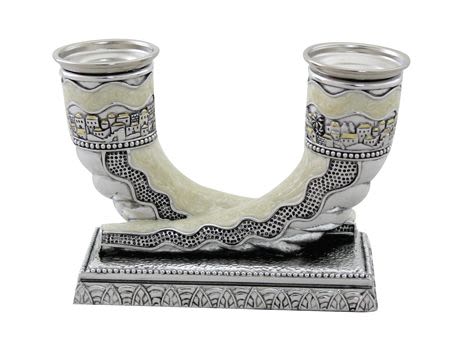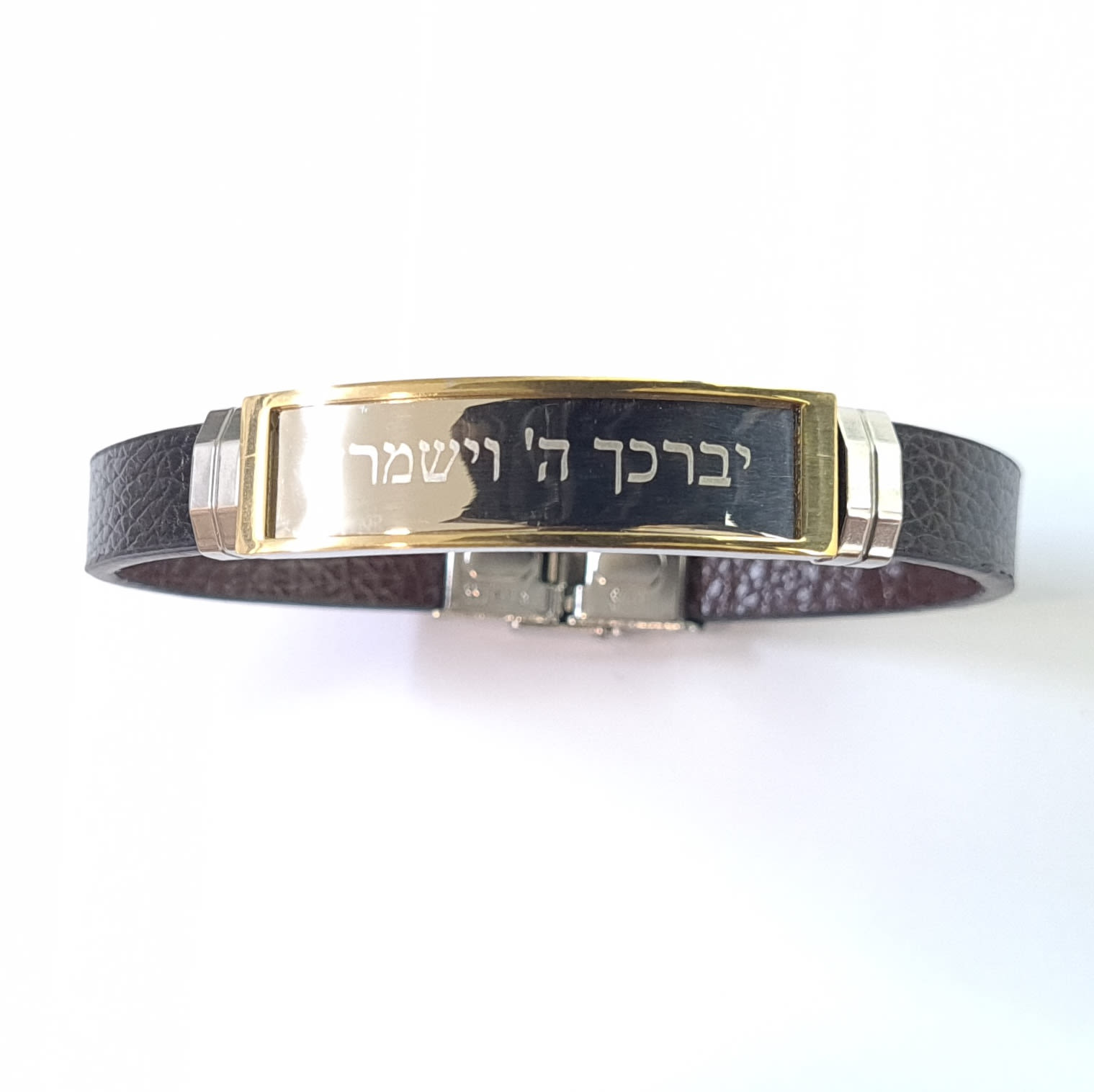
The Joy of the Seer
It has been reported that the joy of the Seer of Lublin was so great that it spilled over to all of his possessions. His table, his chair, even...

The Joy of the Seer
It is know that the great Tzaddik, the Seer of Lublin, was always extremely happy because of the joy he felt in doing mitzvot. That is what brought him to the highest spiritual levels. The joy one feels while doing mitzvot is a wonderful tool for coming close to God, as our Sages taught: “The Shechinah only dwells (upon a person when he is) in a state of joy (that is related to the performance) of mitzvot” (See Baal Shem Tov al HaTorah, Lech Lecha 31). When we take delight in all the mitzvot and good deeds we can do in this world, when we feel happiness about giving God happiness, then we will merit the presence of the Shechinah.
The Baal Shem Tov said that when a person recognizes the good that is hidden within his troubles, he can actually transform his troubles to deliverance (Degel Machaneh Ephraim, at the end of parshat Balak). The fact that there is such an aspect of goodness in all difficulties and problems is hinted to by the verse: “In (my) distress, You have delivered me” (Tehillim 4:2). The Hebrew word for “distress,” tza’ar also means “narrow,” and the word for “you have delivered,” hirchavta can be translated as, “you have broadened.” Hence Rebbe Nachman reads the verse as saying that even when we are constricted and limited by spiritual or physical problems, God continues to show us kindness and to grant us an element of deliverance and relief (Likutey Moharan I:195). In the very midst of our troubles, even in the narrowest straits, God provides us with a point that is broad and expansive, a spark of hope that strengthens our faith that He can save us at any minute. A person must always search for that point of goodness within his troubles – for when he discovers it, he can actually free himself from his suffering.
It has been reported that the joy of the Seer of Lublin was so great that it spilled over to all of his possessions. His table, his chair, even the very walls of his house radiated joy. One Tzaddik who stayed overnight in the Seer’s house, testified that it was impossible for him to fall asleep because the clock on the wall ticked away with such happiness that he constantly wanted to get up and dance.
The opposite is also true: negative emotion and character traits not only affect our lives, they also influence our very possessions. The verse says, “The tools of the miser are evil” (Yeshaya 32:7), which means that even his possessions radiate a sense of selfishness. Our Sages said the same thing when they taught: “From where do we know that even the birds recognize a stingy person? From the verse, ‘In vain the net is baited in the sight of every bird’ (Mishlei 1:17)” (Sotah 38b). The explanation of our Sages’ words is as follows: To catch birds with a net, one must scatter a small amount of grain as bait. A stingy person also does this, but he does it begrudgingly and unhappily, and his stinginess permeates the food itself. The birds can sense this negative spirituality, and they don’t want such food. Hence the stingy person’s net is “baited in vain,” even though his grain is scattered “in the sight of every bird.”
Stabbing Sorrow
The Seer of Lublin was so sensitive to the spirituality of physical objects that he couldn’t sleep on another person’s bed. Whenever he lay down on such a bed, he would sense everything that the owner of the bed had thought and felt as he slept there, and this was so disturbing to the Seer that he would immediately jump off the bed. The thoughts were literally seeped into the mattress and the frame, and the Seer’s sensitive soul was affected by them. When he traveled from town to town, he would only stay in a place where a special bed had been set aside for him, or where his host agreed to provide a new one.
Once the Seer stayed in the home of a man who offered him a brand new bed, which had been constructed by a God-fearing carpenter. To everyone’s surprise, as soon as the Seer lay down on the bed, he immediately cried out, “Oy! It’s stabbing me!” His host hurried to explain: “But this bed was made by a pious Jew, and no one has ever slept on it before!”
“What you say is true,” the Seer answered, “but the bed is full of melancholy and sadness.” After a brief inquiry, it was discovered that the bed had been constructed during the Three Weeks. Indeed, the carpenter had been a pious, God-fearing Jew, but he had been sad and depressed during those days of mourning for the Holy Temple. His melancholy feelings had seeped into his handiwork and for the Seer, it was like being stabbed with a knife (Niflaot HaRebbi 7b).
One thing we learn from this story is that even during the Three Weeks, we must avoid sadness. It is proper to feel bitterness and regret at the Temple’s destruction and the exile of the Shechinah, but we must never allow ourselves to fall into the trap of melancholy or depression.
Tears of Hope
When the emotion of bitterness is entirely free from sadness, it can be extremely beneficial; indeed, it can help to repair the entire world. Rebbe Nachman said that when we recite Tikkun Chatzot, we should think about our own personal exile – our separation from God and damage we have caused with our sins. When we say the words, “I will cry over my Sanctuary day and night”, we should mourn for our own personal sanctuary which needs to be rebuilt. When we cry out, “How has the vestibule been destroyed, and the foundations of the world demolished!” we should think of the Holy Temple of our minds, which is meant to be a dwelling place for the Shechinah, and which has been damaged by our sins (see Shabbos 30b; Zohar 1:180). For when God said, “Make for Me a Sanctuary and I will dwell within them” (Shemot 25:8), He did not say “within it,” but “within them” – which means within each and every Jew (See Likutey Moharan II:101). When we live with the belief that God dwells within us, we can become a living Temple, and the Shechinah can rest upon us. As our Sages said, “When a person has a knowledge of God, it is as if the Temple has been rebuilt in his days” (See Alshich and the Shlah on this verse).
If, on the other hand, the mind is empty of faith and Godliness, it becomes like a desert, or like the empty pit into which Yosef (Joseph) was thrown, about which the Torah writes: “…and the pit was empty, there was no water in it” (Bereishit 37:24). On this, our Sages comment, “There was no water in it, but there were snakes and scorpions” (Shabbat 22a). What a dark and bleak world such a person inhabits! How fitting for him to weep and to apply the words of Tikkun Chatzot to himself!
This is true of the other Kinot, as well. When we apply the words to ourselves we can repair not only our own lives, but also the entire creation; for every person is a part of the larger creation, and hence has the power to influence it.
Nor does our weeping for our individual exile and for the state of our personal Temple mean that we have ceased to weep for the Temple in Jerusalem. On the contrary, our tears will help to rebuild the Temple in Jerusalem. For every individual is a part of the greater, collective unity; and each individual sanctuary is like a building block in the Sanctuary that will be built by the entire Jewish people. When we repair ourselves, we hasten the Temple’s construction, and when the Temple will be rebuilt in Jerusalem, it will also be rebuilt in each of our lives.
Although we may feel very far from God because of our sins, if we yearn for Him and cry out to Him from the bottom of our hearts, we can help to rebuilds the Holy Temple. “Master of the World, I feel so far from you – my life is so empty. What will be with me? Please help me to find You, to come closer to You. Help me to repair all that is wrong in my life.” This type of prayer can draw down God’s light into our lives. In fact, it is precisely when we feel farther from God, and less worthy, that we cry out to God with more force, and hence we draw down a greater light and a greater blessing. As mentioned earlier, the verse, “And a mist went up from the land and watered all the face of the earth” (Bereishit 2:6), is interpreted by the Midrash to mean that when cries of bitterness and longing rise up from the earth to God, they initiate a great flow of Divine blessing that water the earth and brings material and spiritual blessing.
Thus we have come to understand that there are two entirely different types of weeping, and they have opposite results. Tears of sadness must be carefully avoided, for sadness and depression can only distance us from God. But tears of true bitterness – tears from a broken Jewish heart that is full of remorse and a deep longing for God – such tears have a wonderful power to enrich our lives with blessing and happiness.
To be continued…
(Excerpt from The Scent of Gan Eden, by Rabbi Yaakov Meir Shechter, Keren Ohr Publications. Used with author’s permission.)












Tell us what you think!
Thank you for your comment!
It will be published after approval by the Editor.